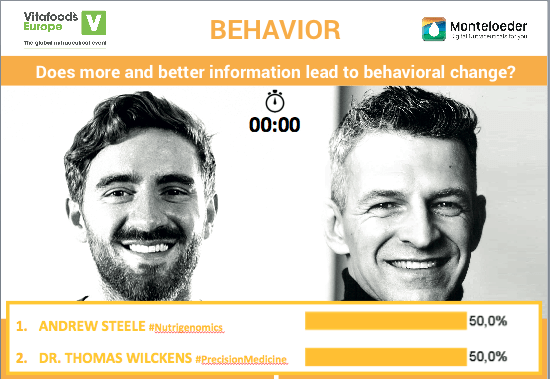Andrew Steele and Dr. Thomas Wilckens answer this question and provide fascinating insights into the world of nutrigenomics and precision medicine.
The Vitafoods Fair 2017 gave us the opportunity of getting to know these two outstanding figures of the nutraceutical industry.
After interviewing the former Olympic track athlete and current co-founder of DNA Fit, Andrew Steele, we became aware of his position regarding the importance of information for nutritional behaviour and genetics.
Steele strongly believes that information and well-being maintain a directly proportional relationship. As he phrased it “if you know a little bit more about yourself, understand more about your personal interaction with what you do, what you eat and how you exercise, you can make informed personalized decisions educated on what works best for you”.
Moreover, Steele explained his reasoning in more detail: “one of the key things for me is that we are, as humans, made up of two things: how we are born and what we do”. This argumentation stresses the idea that it is important to accept, analyse and be informed about your biological conditions in order to make knowledgeable decisions that lead to healthy habits.
On the other hand, Dr. Wilckens approached the question from a different angle. First, he expressed his perception of the Vitafoods fair and the nutraceutical industry describing them as “different, since they focus on the customers’ needs first and then build digital solutions around them”.
Based on his experience in the field as CEO/CSO of Innventis Inc. he explained that “changing consumer behaviour is notoriously painful and difficult” and, as a result, more solutions such as digital coaching, smart food, or smart nutraceuticals will be needed in the future to solve health problems before they arise.
Both opinions were confronted later on in Monteloeder’s face-to-face interactive debate. Here, Andrew Steele made use of his experience as an Olympic athlete to illustrate how in coaching and training, like in nutrition, the more information you have the better you can prepare yourself.
On the opposing side, Dr. Thomas Wilckens explained that information can lead to a change in behaviour but only up to a certain extent. Therefore, smart foods, smart advice, and smart drugs should be implemented to generate a significant socio-economic impact on the population and reduce chronic diseases or severe conditions.
Both approaches seemed to be equally relevant to the audience since the same number of votes were granted to each speaker, making Monteloeder’s first interactive debate end in a tie. This debate was the first of a series of events in which Monteloeder aims to immerse the audience into the world of nutrigenomics, precision medicine, and the nutraceutical industry.
Related articles:
https://www.monteloeder.com/blog/2017/06/does-the-objective-affect-the-way-the-products-will-be-designed/
https://www.monteloeder.com/blog/2017/06/disruption-will-data-fundamentally-transform-the-industry/
https://www.monteloeder.com/blog/2017/06/are-regulations-slowing-down-innovation/


